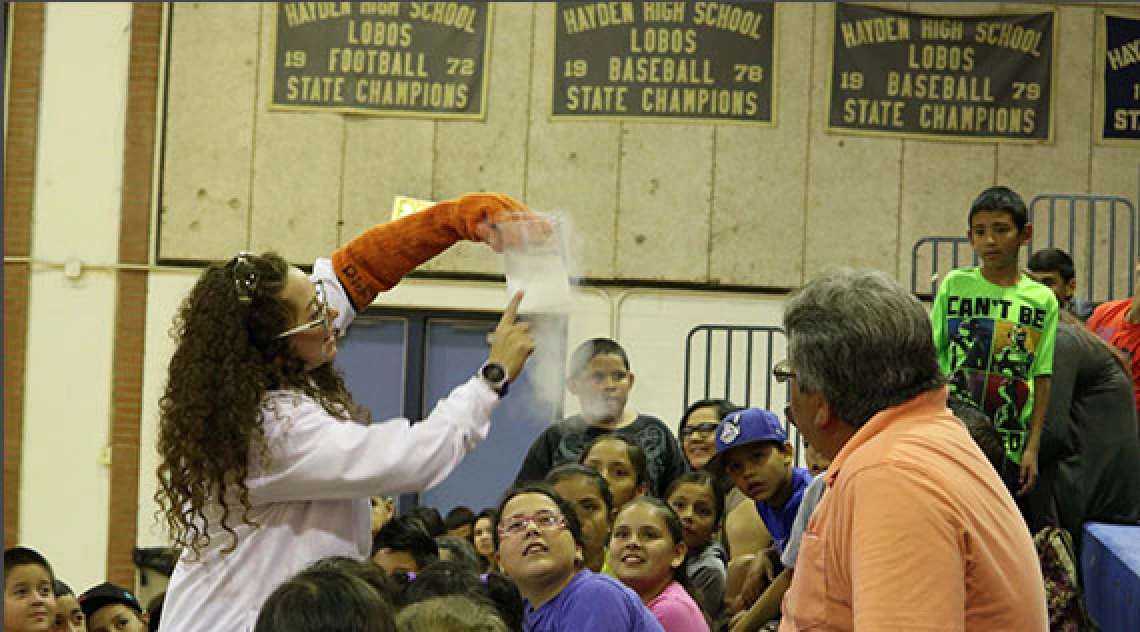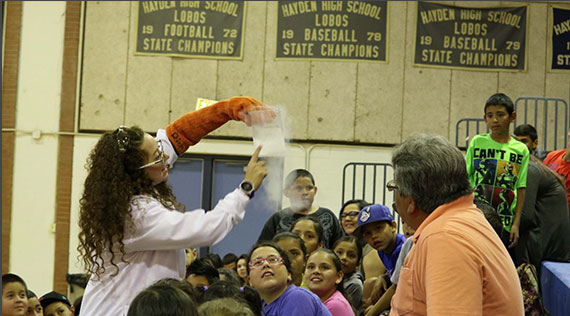Investigator Update: Dr. Mónica Ramírez-Andreotta

 Dr. Mónica Ramírez-Andreotta is an Assistant Professor in the Department of Soil, Water, and Environmental Science and principal investigator of the UA Superfund Research Program (UA SRP) Research Translation Core (RTC). Her research focuses on environmental contamination, soil/food quality, and phytotechnologies to improve soil and air quality. But what is truly unique about Ramírez-Andreotta’s approach is that she seamlessly integrates research translation and citizen science into her research program in ways that are already having an impact nationally and internationally.
Dr. Mónica Ramírez-Andreotta is an Assistant Professor in the Department of Soil, Water, and Environmental Science and principal investigator of the UA Superfund Research Program (UA SRP) Research Translation Core (RTC). Her research focuses on environmental contamination, soil/food quality, and phytotechnologies to improve soil and air quality. But what is truly unique about Ramírez-Andreotta’s approach is that she seamlessly integrates research translation and citizen science into her research program in ways that are already having an impact nationally and internationally.
Here we highlight some of her recent efforts.
Ramírez-Andreotta is part of a team that recently wrote “Stakeholder Analysis: International Citizen Science Stakeholder Analysis on Data Interoperability”, a report (https://www.wilsoncenter.org/sites/default/files/stakeholder_analysis_0.pdf) published by the Wilson Center. This study lays the groundwork for standardization of citizen science data so that interoperability projects can proceed in an inclusive and sensitive way and set the scene for future research into countries beyond those surveyed.
Since 2013, Ramírez-Andreotta has led efforts to organize and hold quarterly multi-organizational teleconferences about the status of remedial efforts at two Arizona Superfund sites that involve state (Arizona Department of Environmental Quality, Arizona Department of Health Services), federal (U.S. Environmental Protection Agency, Agency for Toxic Substances and Disease Registry), local (town or city environmental branches) officials as well as university researchers and community members. These transdisciplinary teams share relevant information concerning the Superfund sites, help to coordinate site activities, and work together to develop public messaging.
Ramírez-Andreotta’s true passion is involving communities in the scientific questions regarding contamination and exposures they may experience. As such, she is often found at locations around Arizona talking to and training communities in various environmental monitoring approaches. Her original citizen science project Gardenroots, which involves communities in assessing how contamination impacts home-grown vegetables, has now expanded across Arizona. Additionally, Ramirez-Andreotta now leads Project Harvest , a citizen science project designed to monitor harvest rainwater in addition to soil and plants across Pima, Yavapai, Gila, and Pinal Arizona counties. Since 2015, Ramírez-Andreotta has given 31 talks and trainings around the State.
Ramírez-Andreotta has worked to leverage her UA SRP experience into a robust portfolio of grants to support her research efforts. Most recently, Ramírez-Andreotta is part of a team that was awarded “Dirt Alert: legacy mining contaminant impacts in preschools” by the California Breast Cancer Research Program. This grant will expand previous work by project partners Cancer Prevention Institute of California (Peggy Reynolds) and Sierra Streams Institute (Joanne Hild and Katy Janes) by assessing whether young children, who represent a particularly important window of vulnerability for breast cancer, are being exposed to the metals of concern in preschool gardens, through incidental soil ingestion, inhalation of metal-containing dust, and consumption of plants grown in local gardens. Using a Gardenroots citizen science approach, the project will actively involve community members to develop the research plan, sample collection, and report back materials for participants and the community.
The UA SRP congratulates Ramírez-Andreotta on these achievements. She exemplifies how research translation and citizen science can be harmoniously incorporated into environmental health research.

